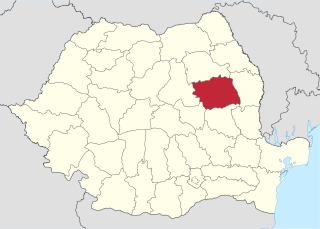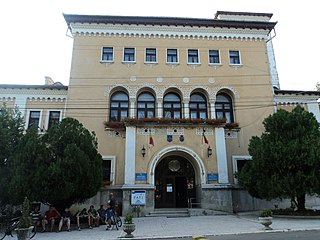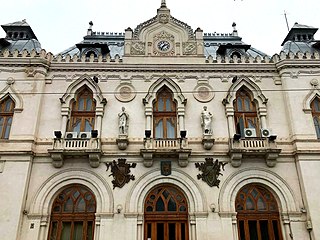
Neamț County is a county (județ) of Romania, in the historic region of Moldavia, with the county seat at Piatra Neamț.

Vaslui County is a county (județ) of Romania, in the historical region Moldavia, with the seat at Vaslui.

Iași County is a county (județ) of Romania, in Moldavia, with the administrative seat at Iași. It is the most populous county in Romania, after the Municipality of Bucharest.

Bacău County is a county (județ) of Romania, in Moldavia, with its capital city at Bacău. It has one commune, Ghimeș-Făget, in Transylvania.

Vlașca County is a former first-order administrative division of the Kingdom of Romania, in southern Muntenia, located between Bucharest and the Danube, which is now mostly the county of Giurgiu. The county seat was Giurgiu.

Soroca County was a county in the Kingdom of Romania. The seat was Soroca.

Dorohoi County, with its seat at Dorohoi, was a subdivision of the Kingdom of Romania and located in the region of Moldavia.

Fălciu County was an administrative territorial entity in Moldavia, then a county (judeṭ) in Romania between 1859 and 1950. Its capital was the town of Huși. Another important town was Fălciu.

Tutova County is one of the historic counties of Moldavia, Romania with the city of Bârlad as capital.

Bălți County was a county in the Kingdom of Romania between 1925 and 1938, with the seat at Bălți.

Severin County was a county in the Kingdom of Romania, in the historical region of the Banat. Its capital was Lugoj. Severin County was established in 1926, disbanded with the administrative reform of 1938, re-created in 1940, and finally disbanded with the administrative reform of 1950.

Romanați County was a county in the Kingdom of Romania, in southeastern part of the historical region of Oltenia. The county seat was Caracal.

Putna County was a county in the Kingdom of Romania, in southern Moldavia. The county seat was Focșani.

Baia County is one of the historic counties of Moldavia, Romania. The county seat was Fălticeni.

Câmpulung County is one of the historic counties of the Kingdom of Romania, in the historical region of Bukovina. The county seat was Câmpulung Moldovenesc.

Caraș County is one of the historic counties Romania in the historic region of the Banat. The county seat was Oravița. The county was founded in 1926, following the division of the former Caraş-Severin County.

Covurlui County is one of the historic counties of Moldavia, Romania. The county seat was Galați.

Năsăud County is one of the historic counties of Transylvania, Romania. The county seat was Bistrița.

Râmnicu Sărat County is one of the historic counties of Muntenia, Romania. The county seat was Râmnicu Sărat.

Tecuci County was a county in the Kingdom of Romania, in the historical region Moldavia. The county seat was Tecuci.























